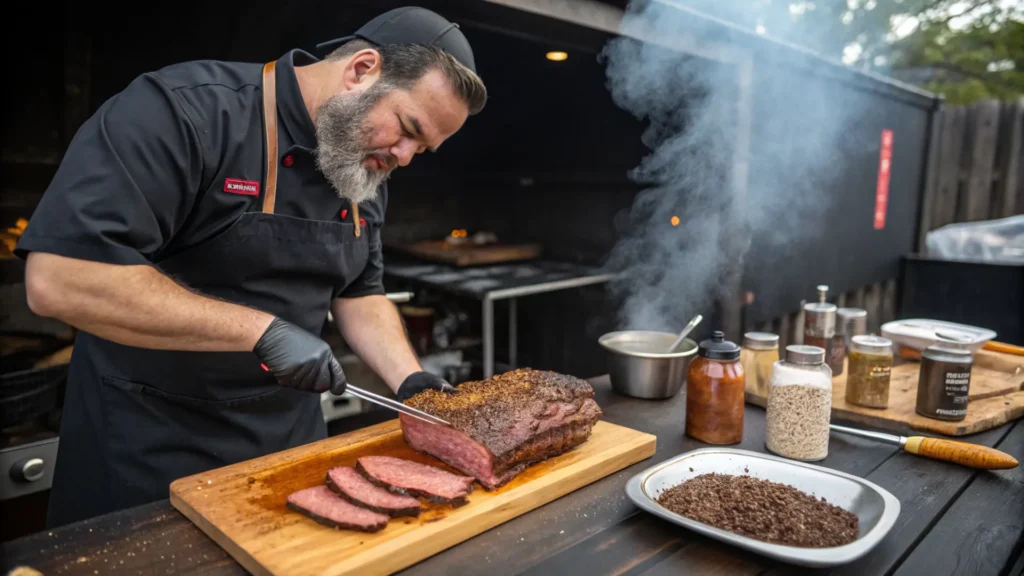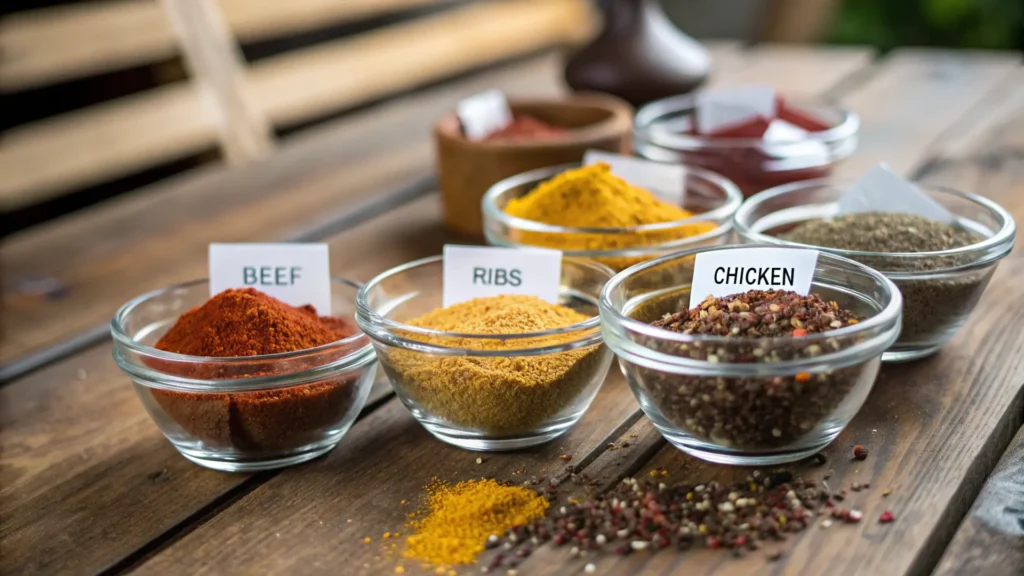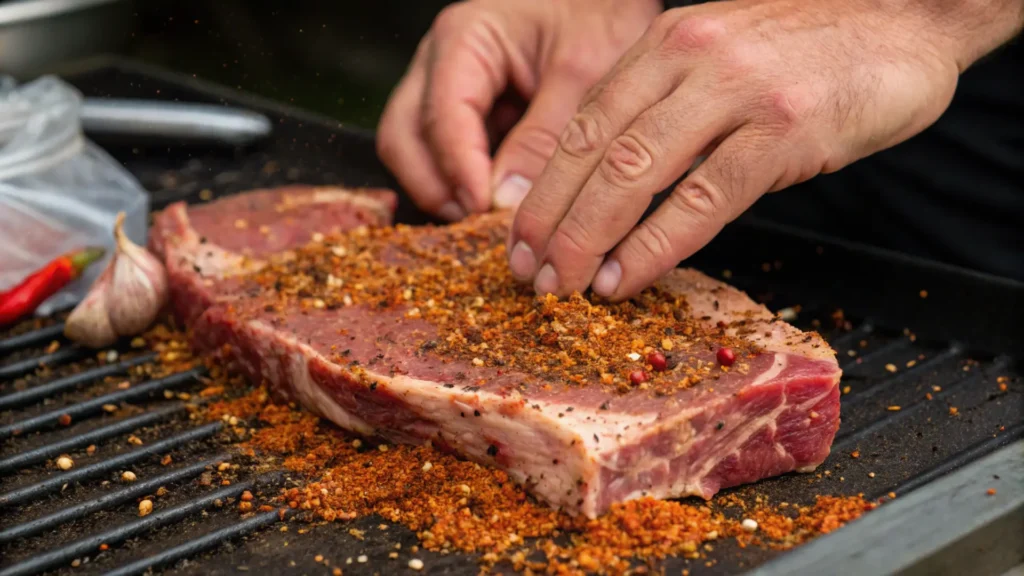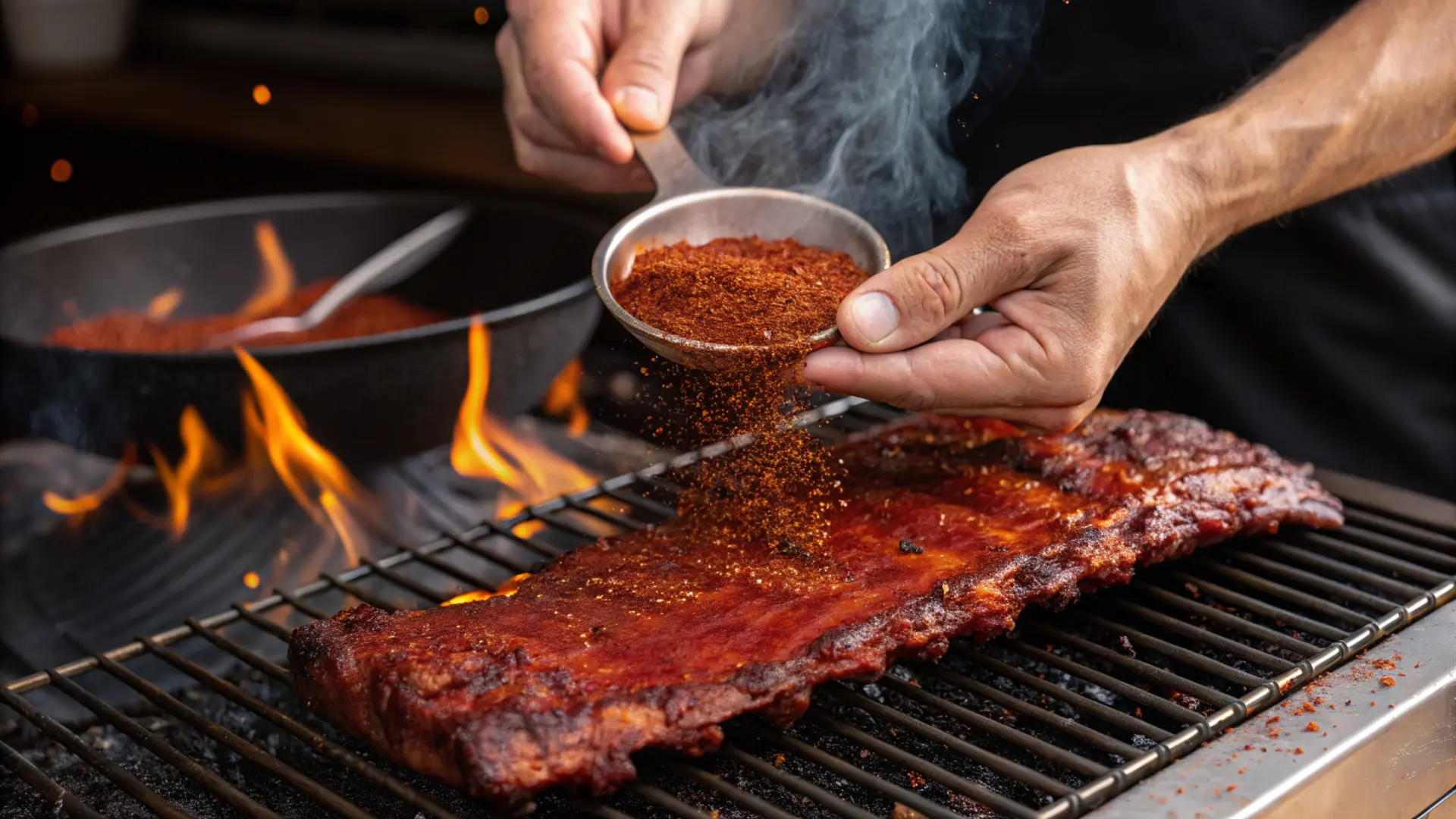Barbecue is more than just cooking meat—it’s an art. And at the heart of every delicious BBQ dish is the perfect BBQ rub. Whether you’re a weekend griller or an experienced pitmaster, understanding BBQ rubs can take your grilling game to the next level.
In this guide, we’ll cover everything about BBQ rubs, from the best blends to pitmaster favorites, the differences between rubs and seasonings, and whether it’s cheaper to make your own. Get ready to unlock mouthwatering flavors with this ultimate BBQ rub guide.
Looking for inspiration? Try Creative Ways to Use Chex Cereal: Delicious Recipes and Tips.
Table of Contents
What Are BBQ Rubs?
Understanding the Basics of BBQ Rubs
BBQ rubs are dry or wet seasoning blends used to coat meat before cooking. They enhance flavor, create a delicious crust, and improve texture.
Types of BBQ Rubs: Dry vs. Wet Rubs
- Dry Rubs: A mix of spices and herbs without liquid ingredients. They create a crust when grilled or smoked.
- Wet Rubs: A combination of spices mixed with oil, vinegar, or mustard to form a paste. They add moisture and deep flavor penetration.
Check out Italian Sausage Pasta Bake Recipe: The Best Comfort Food for Family Meals for a great dish to pair with your BBQ meats.
What Are Some Good Barbecue Rubs?
Best Store-Bought BBQ Rubs
- Meat Church Holy Gospel Rub – A sweet and savory blend perfect for ribs and chicken.
- Killer Hogs BBQ Rub – Classic Southern BBQ flavor with a balanced mix of sweetness, heat, and salt.
- Plowboys Yardbird Rub – A competition-winning rub that works great on ribs and chicken.
- Traeger Fin & Feather Rub – A versatile rub for fish and poultry with citrus and garlic notes.
- Kosmos Q Cow Cover – A bold beef rub that enhances steak and brisket flavors.
Best Homemade BBQ Rub Recipe
Try this simple all-purpose BBQ rub:
- ¼ cup brown sugar
- 2 tbsp paprika
- 1 tbsp black pepper
- 1 tbsp salt
- 1 tbsp garlic powder
- 1 tbsp onion powder
- 1 tsp cayenne pepper
- 1 tsp mustard powder
Mix and store in an airtight container for up to six months.
What Rubs Do Pitmasters Use?

Secret Ingredients in Pitmaster Rubs
Pitmasters often customize their rubs with:
- Turbinado sugar: Doesn’t burn as quickly as regular sugar.
- Celery salt: Enhances umami flavor.
- Ground coffee: Adds depth to beef rubs.
- MSG (Monosodium Glutamate): Intensifies savory taste.
Famous Pitmaster BBQ Rubs
- Aaron Franklin’s Brisket Rub: Just salt and black pepper for Texas-style BBQ.
- Myron Mixon’s Competition Rub: Brown sugar, paprika, salt, and a secret spice blend.
- Rodney Scott’s ribs Rub: Includes mustard powder and vinegar for a tangy finish.
Learn from the experts at BBQGuys: Top Pitmaster BBQ Rubs
What’s the Difference Between BBQ Seasoning and BBQ Rub?
BBQ Rub vs. BBQ Seasoning: Key Differences
| Feature | BBQ Rub | BBQ Seasoning |
|---|---|---|
| Texture | Coarse, chunky | Fine powder |
| Usage | Applied in a thick layer before cooking | Used lightly as a finishing touch |
| Cooking Method | Slow-cooked, smoked, or grilled | Added after or during cooking |
BBQ rubs create a crust, while BBQ seasoning enhances flavor without texture change.
Is It Cheaper to Make Your Own BBQ Rub?
Cost Comparison: Store-Bought vs. Homemade BBQ Rub
- Store-bought BBQ rubs: $8–$15 per jar
- Homemade BBQ rubs: Costs around $3–$5 per batch
Making your own rub is cheaper and lets you control salt, sugar, and spice levels.
DIY vs. Pre-Made: Which Is Better?
- Pre-made rubs save time and offer consistency.
- Homemade rubs allow customization and cost savings.
Get cost breakdowns from Serious Eats: DIY vs. Store-Bought BBQ Rubs
Best BBQ Rubs for Different Meats

Best BBQ Rubs for Beef
- Salt & Pepper (Texas-Style)
- Montreal Steak Rub
- Coffee-Based Rubs
Best BBQ Rubs for ribs
- Sweet and Smoky Brown Sugar Rub
- Classic Memphis Dry Rub
- Apple Cider Vinegar-Based Rubs
Best BBQ Rubs for Chicken
- Lemon Pepper Rub
- Garlic Herb Butter Rub
- Spicy Cajun Rub
Discover great ideas like Rise & Shine with Rihana’s Breakfasts for morning-after BBQ meals.
How to Apply BBQ Rubs for Maximum Flavor

Step-by-Step Guide to Applying BBQ Rubs
- Pat the meat dry to help rub stick better.
- Apply a binding agent (mustard, oil, or Worcestershire sauce).
- Evenly coat the meat with the rub.
- Let it rest for 30 minutes to overnight for deeper flavor.
- Cook using your preferred BBQ method.
Pro Tips for Best Results
- Use more rub for large cuts like brisket.
- For ribs and chicken, balance sweetness with spice.
- Store homemade rubs in glass jars for freshness.
Common Mistakes to Avoid When Using BBQ Rubs
1. Using Too Much Salt
Some store-bought rubs already contain salt, so avoid over-seasoning.
2. Skipping the Resting Time
Let the rub absorb into the meat for at least 30 minutes before cooking.
3. Not Matching Rubs with the Right Meat
- Sweet rubs work best on ribs.
- Peppery rubs shine on beef.
- Citrus and herb rubs enhance chicken.
Best Places to Buy BBQ Rubs Online
Looking for top-quality BBQ rubs? Check out these websites:
- BBQGuys – Wide selection of premium BBQ rubs.
- Meat Church – Handmade rubs by expert pitmasters.
- Kosmos Q – Award-winning competition rubs.
FAQ Section
What are some good barbecue rubs?
Some top BBQ rubs include Meat Church Holy Gospel, Killer Hogs BBQ Rub, and homemade blends with brown sugar, paprika, and garlic.
What rubs do pitmasters use?
Pitmasters often use simple salt-and-pepper rubs for brisket and sweet-spicy rubs for ribs.
What’s the difference between BBQ seasoning and BBQ rub?
BBQ rubs are coarse spice mixes applied before cooking, while BBQ seasonings are fine powders used as finishing touches.
Is it cheaper to make your own BBQ rub?
Yes! Homemade BBQ rubs cost around $3–$5 per batch, while store-bought rubs range from $8–$15.
BBQ rubs are essential for bringing out the best flavors in grilled meats. Whether you use a store-bought mix or a homemade blend, choosing the right rub will elevate your barbecue to the next level.
For more expert BBQ tips and recipes, check out Rihana Recipes.
Don’t miss our 5 Tips for Healthy Dinner Plates to Boost Your Energy for balanced BBQ meals.

